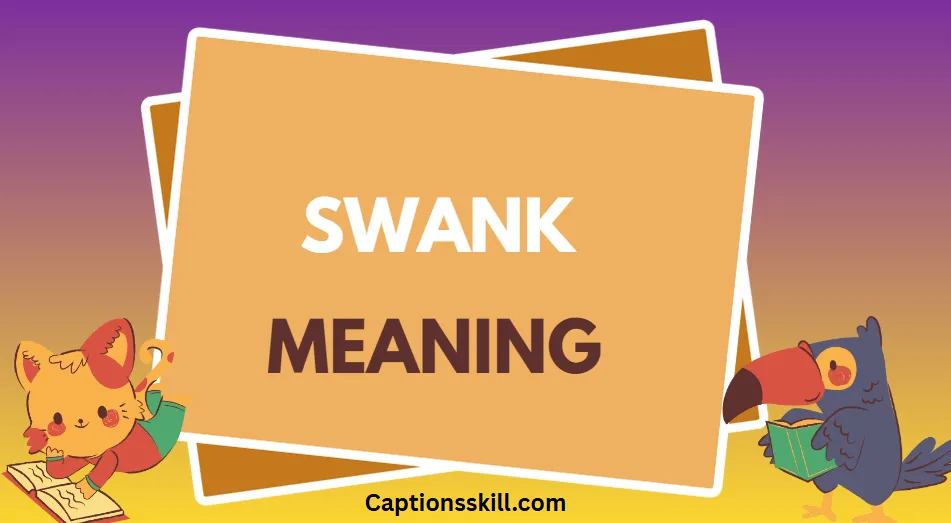Language is a living, breathing entity that evolves with culture, society, and technology. Words that once meant one thing may transform into something completely different over time. One such fascinating word is “swank.” At first glance, “swank” may look like just another everyday term, but its history, meanings, and cultural usage make it far more interesting than most people realize.
The term has been used across different contexts, from high society and luxury fashion to street slang and even modern entertainment. Depending on where and how it’s used, “swank” can describe elegance, style, arrogance, or extravagance. It has been adapted in various English dialects and even borrowed into other languages, including Bengali, where people search for “swank meaning in Bengali” to understand how it translates.
In recent times, “swank” has found a place in pop culture, online slang, and even technology references like “swank meaning camera,” which describes stylish or premium-looking camera gear. In informal circles, you might hear “swank” used to praise someone’s fashion sense, while in literature and older usage, it might carry undertones of showing off or arrogance.
This article dives deep into the meaning, origin, evolution, usage, and cultural significance of “swank.” We’ll explore whether it’s slang, an acronym, or a proper name, discuss its dictionary status, and provide plenty of examples so you can fully grasp how to use it in real life. Whether you’re learning English, exploring slang, or just curious about words, this comprehensive guide will give you a clear understanding of what “swank” really means.
What Does “Swank” Mean?
At its core, “swank” refers to style, elegance, or an impressive display of wealth or taste. It often describes something that is fashionable, classy, or luxurious. For example, if someone says, “That’s a swank hotel,” they mean it’s upscale, stylish, and expensive-looking.
However, the word also carries subtle undertones depending on context:
- Positive Use – Complimenting someone’s sophistication or sense of style.
- Neutral Use – Referring to luxurious surroundings such as “a swank party.”
- Negative Use – Suggesting pretentiousness or arrogance, as in “He likes to swank around in his sports car.”
In modern slang, “swank” can even mean something cool, fashionable, or trendy. Younger generations might say, “That outfit is swank,” meaning it’s stylish in a bold way.
For those wondering about “swank meaning in English,” dictionaries define it broadly as displaying one’s wealth, stylishness, or grandeur. Meanwhile, “swank meaning in Bengali” often translates to terms describing richness, luxury, or flamboyance, though it may not have a perfect one-to-one translation.
The versatility of “swank” is what makes it so interesting—it shifts between admiration and critique, depending on who is saying it and how it’s said.
The Origin and Evolution of “Swank”
The word “swank” dates back to the early 19th century and is believed to have originated in Scotland and Northern England. Initially, it was used to describe a person who strutted around with arrogance or an air of superiority. The word itself likely derived from dialectal roots meaning to swagger or boast.
As time passed, “swank” broadened in meaning. By the late 19th and early 20th centuries, it became associated with high society and fashionable living. People began using it to describe luxurious homes, elegant clothing, and extravagant lifestyles.
In literature, “swank” appeared in works of the early 20th century to highlight upper-class characters or fancy settings. Over time, its association with wealth and sophistication became more prominent, especially in American English.
By the late 20th century, the term slipped into slang culture, where it became synonymous with coolness and trendiness. This explains why searches for “swank meaning slang” are so common today. The word continues to evolve, adapting to digital culture, memes, and even brand names.
From its humble beginnings as a word for arrogant swagger, “swank” has grown into a multifaceted expression of luxury, fashion, and style.
Is “Swank” a Slang, Acronym, or Name?
One of the most common questions people ask is whether “swank” is purely slang, an acronym, or even a proper name. The truth is—it can be all three, depending on context.
- As Slang – “Swank” is widely used in slang to mean stylish, fashionable, or impressive. It’s often interchangeable with words like “posh,” “fancy,” or “classy.”
- As a Proper Name – “Swank” is also a surname, most famously carried by the Hollywood actress Hilary Swank. In this case, it’s simply a family name and not related to its slang meaning.
- As an Acronym – While less common, “SWANK” has occasionally been used as an acronym in niche groups or online communities. For example, it has appeared in design and fashion circles as shorthand for phrases like “Style With A New Kick.”
Therefore, “swank” is primarily slang, but it can also function as a name or acronym in specific contexts. This flexibility is one of the reasons the word continues to thrive in modern language.
“Swank” Pronunciation & Spelling
The word “swank” is pronounced as:
/swæŋk/ (rhymes with bank or thank).
Breaking it down:
- Sw- → pronounced like “swim”
- -ank → pronounced like “bank”
It is spelled S-W-A-N-K, and unlike many English words, it does not have multiple confusing spellings.
Interestingly, in slang usage, you might also see variations like:
- Swanky – an adjective meaning stylish, elegant, or expensive. Example: “They live in a swanky apartment.”
- Swankin’ – informal, used in some dialects to describe showing off.
- The Swank – sometimes used as a nickname or brand name.
Because of its simple spelling and clear pronunciation, “swank” has remained easy to use and recognize across cultures. Even in languages like Bengali, where people search for “swank meaning in Bengali,” the pronunciation doesn’t drastically change.
How People Use “Swank” Today
In modern times, “swank” has expanded beyond its original meaning and is widely used in everyday conversation, fashion, entertainment, and online slang. Here are the main ways people use it:
- Fashion and Style – Describing something elegant or stylish. Example: “That’s a swank jacket.”
- Luxury and Class – Referring to expensive or posh settings. Example: “We went to a swank restaurant downtown.”
- Arrogance or Showing Off – Suggesting someone is flaunting wealth or success. Example: “He always tries to swank around with his car.”
- Pop Culture and Music – Used in lyrics and media to describe high-class lifestyles or fashionable living.
- Technology and Design – In phrases like “swank camera” or “swank setup,” it implies sleek, modern, and premium design.
- Everyday Compliment – Among younger generations, it’s used as slang for cool or trendy.
This versatility explains why “swank” has stood the test of time. It can be used to compliment, criticize, or simply describe style and luxury. In the digital world, hashtags like #swanklife or #swankstyle are common on Instagram and TikTok, reinforcing its modern slang status.
Examples of “Swank” in a Sentence
Here are 20 real-life examples of how you can use “swank” in everyday conversation:
- She walked into the swank party wearing a designer dress.
- That’s a swank apartment with a rooftop pool.
- He likes to swank around in his expensive suits.
- Their wedding was held at a swank resort.
- I bought a swank leather jacket yesterday.
- The hotel lobby looked incredibly swank.
- Stop trying to swank about your new car.
- The movie premiere was a swank affair.
- They moved into a swank neighborhood.
- His swank attitude annoyed his colleagues.
- That’s one swank camera setup you have.
- The restaurant served swank dishes with gold flakes.
- She decorated her house in a swank modern style.
- He wore a swank wristwatch worth thousands.
- The gala was filled with swank celebrities.
- Don’t swank about your money—it’s rude.
- The car show featured some swank sports cars.
- Her jewelry collection is swank and elegant.
- They enjoyed cocktails at a swank rooftop bar.
- The magazine is filled with swank fashion spreads.
Other Possible Meanings of “Swank”
While most people recognize “swank” as a word tied to luxury, style, and arrogance, it actually carries a range of meanings depending on context, culture, and usage.
- Surname/Proper Noun – As mentioned earlier, “Swank” is a family name. The most famous example is Hilary Swank, the Academy Award-winning actress. In this case, the meaning has nothing to do with fashion or arrogance—it’s simply a surname of German origin.
- Old English Dialect – Historically, “swank” meant a young man, servant, or farmhand. In certain parts of Britain, this older meaning still appears in literature or dialectal speech.
- Verb Form – “To swank” means to swagger, boast, or show off. This usage is less common in American English today but still appears in British English. Example: “He swanked about after winning the match.”
- Bengali & Other Translations – In Bengali, “swank” often translates to words meaning luxury, elegance, or grandeur. However, it may also imply showiness or pretension, depending on context.
- Branding & Products – “Swank” is sometimes used as a brand name in industries like fashion, jewelry, and even cameras. Searches for “swank meaning camera” stem from premium camera gear or stylish designs being marketed with the word “swank.”
- Pop Culture Reference – “Swank” has been used as a nickname or stage name in entertainment and hip-hop culture, where it symbolizes wealth and trendiness.
This range of meanings shows how “swank” can be playful, formal, or even historical depending on how and where it’s used.
Words and Acronyms Related to “Swank”
Since “swank” connects to style, luxury, and swagger, several related words and acronyms overlap with its meaning:
- Swanky – Adjective form, meaning elegant, stylish, or posh.
- Swagger – Similar in tone, suggesting confidence, style, or arrogance.
- Posh – Commonly used in British English to describe luxury or elegance.
- Classy – A polite, positive way to describe sophistication.
- Flashy – Similar to “swank” but with a stronger negative connotation of showing off.
- Boujee – Modern slang derived from “bourgeois,” often used to describe extravagant or swank lifestyles.
- Chic – French-inspired word for fashionable elegance.
- SWANK (as an acronym) – Occasionally used for “Style With A New Kick” or niche brand taglines in fashion circles.
These related terms show how “swank” fits into a broader vocabulary of style, wealth, and luxury.
Is “Swank” in the Dictionary?
Yes, “swank” is officially recognized in major English dictionaries. It is not just slang—it’s a legitimate word with historical roots.
- Merriam-Webster defines it as swagger, arrogance, or stylish elegance.
- Cambridge Dictionary lists it as meaning very fashionable and expensive in a way that is intended to attract attention.
- Oxford English Dictionary (OED) traces its origins to the early 19th century and notes both noun and verb forms.
The presence of “swank” in dictionaries proves that it is more than passing slang—it has been an established part of the English language for centuries.
In addition, variations like “swanky” are also included in dictionaries, often defined as expensive and fashionable.
So if you’re asking whether “swank meaning in English” is legitimate, the answer is yes—it’s fully documented and widely accepted.
Better Alternatives to Say “Swank”
While “swank” is expressive, sometimes you may want to use a different word that’s clearer or more context-appropriate. Here are some better alternatives:
- Classy – Polished and sophisticated without being arrogant.
- Elegant – Graceful, refined, and stylish.
- Chic – Fashionable in a trendy yet tasteful way.
- Upscale – High-end, premium, or luxury.
- Posh – A distinctly British alternative to swank.
- Lavish – Rich, extravagant, and impressive.
- Flashy – Stylish but bordering on show-off.
- Boujee – Modern slang for stylish and wealthy.
- Stylish – A safe, universal synonym.
- Trendy – Popular and fashionable in the current moment.
Each alternative has a slightly different nuance. For instance, “classy” has a positive undertone, while “flashy” leans negative. Choosing the right alternative depends on whether you want to praise someone’s style or criticize their showiness.
Cultural and Generational Impact of “Swank”
“Swank” has had a fascinating cultural journey.
- Early 20th Century – Associated with the upper class and luxurious lifestyles. People used it to describe fancy hotels, theaters, and social gatherings.
- Mid 20th Century – Entered mainstream usage in the U.S., especially through fashion magazines and Hollywood films. It became a status word.
- Late 20th Century – Adopted in slang culture to describe something stylish or impressive. Rappers and musicians often used “swank” or “swanky” to signify wealth.
- 21st Century Digital Age – The word has found a new life on social media platforms like Instagram and TikTok, where hashtags like #swanklife or #swankstyle promote luxury lifestyles.
Generationally, younger audiences tend to use “swank” in a more positive, trendy sense, while older generations might still associate it with arrogance or pretension.
The cultural endurance of “swank” shows its ability to adapt with changing times. It remains a bridge between old-world elegance and modern slang coolness.
Why It’s Important to Know These Words
Understanding words like “swank” is more than just learning vocabulary—it’s about improving communication and cultural awareness.
- Context Matters – Knowing when “swank” is a compliment versus an insult prevents misunderstandings.
- Cultural Literacy – Words like “swank” appear in movies, songs, books, and social media. Recognizing them helps you connect with cultural references.
- Language Growth – Exploring words with layered meanings expands your vocabulary and makes your speech more versatile.
- Cross-Language Relevance – Since people search for “swank meaning in Bengali” and other translations, understanding it helps non-native speakers bridge cultural gaps.
- Professional Use – In writing or marketing, words like “swank” can elevate descriptions of fashion, luxury, or premium products.
Simply put, knowing “swank” helps you communicate better, sound more fluent, and understand cultural nuances that shape modern English.
The Future of the Word “Swank”
Looking ahead, “swank” is unlikely to disappear. Instead, it will continue evolving:
- In Slang – It will remain a popular way to describe stylishness, especially among younger generations.
- In Branding – Expect more companies in fashion, jewelry, and lifestyle to adopt “swank” as a brand name because of its strong association with luxury.
- In Technology – As seen with “swank camera,” the word may extend into tech culture, describing sleek or stylish gadgets.
- In Pop Culture – With celebrities and influencers showcasing luxury lifestyles, “swank” will keep its relevance on platforms like TikTok and Instagram.
- In Global Usage – Since non-native speakers actively search for its meaning, “swank” may gain stronger footholds in languages like Bengali, Hindi, and Spanish.
The future of “swank” lies in its adaptability—it can be classy, slangy, or brand-friendly. Its ability to shift with culture ensures it will remain part of the English vocabulary for years to come.
Frequently Asked Questions (FAQs)
Q1: What does “swank” mean in simple words?
It means stylish, fancy, or showing off wealth.
Q2: Is “swank” positive or negative?
It can be both—positive when praising elegance, negative when criticizing arrogance.
Q3: What is the Bengali meaning of “swank”?
It translates to luxury, elegance, or flamboyance in Bengali, depending on context.
Q4: Is “swank” a real dictionary word?
Yes, it’s listed in major dictionaries like Merriam-Webster, Cambridge, and Oxford.
Q5: What’s the difference between “swank” and “swanky”?
“Swank” is the base word, while “swanky” is an adjective form used more commonly to describe stylish things.
Q6: Can “swank” be used in formal writing?
Yes, but only in contexts describing luxury or style. In formal tone, synonyms like “elegant” or “classy” may be better.
Q7: Is “swank” slang?
Yes, in modern use it’s often slang, but historically it was part of standard English.
Conclusion
The word “swank” is more than just a trendy term—it’s a rich, historical, and culturally adaptive word that has moved from early English dialects to modern-day slang. It can mean luxury, elegance, swagger, or even arrogance, depending on context.
From its early 19th-century origins to today’s social media-driven world, “swank” has remained versatile and relevant. It’s recognized in dictionaries, used in slang, embraced in branding, and even searched globally in translations like Bengali.
Understanding the meaning, usage, and impact of “swank” not only improves your vocabulary but also helps you connect with culture, style, and language trends. Whether you want to describe a swank hotel, a swank outfit, or someone who loves to swank around, this word offers you a stylish way to express yourself.
Also Read: gabagool meaning

Jean Moreau is a talented writer known for crafting engaging captions that resonate with audiences. His creativity enhances social media content effectively.






Leave a Reply